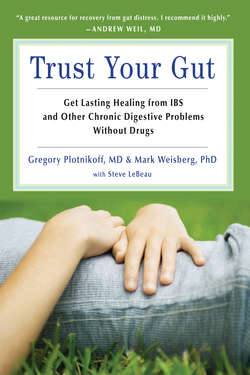Читать книгу Trust Your Gut - Gregory Plotnikoff - Страница 33
На сайте Литреса книга снята с продажи.
Back to the Center
ОглавлениеSo what do we mean when we say trusting your gut is the key to becoming centered? Our patients who have successfully gone through the CORE program have learned to respond to their intestinal sensations in such a way that they no longer experience them as threats. The sensations have become friendly sources of information, helpful messages rather than something to fear. These people have broken out of the vicious circle of pain and distress, bloating, diarrhea, and constipation. They have learned to trust their gut, and they have changed their attitude, allowing their body/mind system to become more centered. These people are now more aware and observant of many aspects of life. Because they have changed their habits, their intestinal suffering is greatly diminished and often eliminated. You can do the same.
The Five Most Important Supplements to Support Centering
Centering may be unnecessarily difficult if our nutritional status is compromised. To ensure a strong and healthy metabolic core, we recommend supplementing your diet with the following:
1 Vitamin D (also called vitamin D3): This is a crucial hormone that turns on or off more than 2,000 key genes in our body. There are vitamin D receptors on every cell of our body, including throughout the brain and the intestines. Low levels of vitamin D in the blood stream are associated with increased risk of an incredible array of diseases as well as severity of multiple others including nonspecific musculoskeletal pain, muscular weakness, asthma, allergies and autoimmune disease. Get tested and take supplements as need. Aim for a blood level of 40–60 ng/ml.
2 A good multivitamin: For us, a good vitamin is absorbable, gentle, and made of high quality ingredients. Watch out for vitamin E as DL-alpha tocopherol. If you see this DL on the label, think “don't like.” Choose mixed tocopherols (and tocotrienols, if possible) that include alpha, beta, delta, and gamma forms.
3 Fish oil or krill oil: These supplements are rich in omega-3 fatty acids (EPA and DHA). Low levels of omega-3 are associated with gut distress including pain and cramping. A fish or krill oil supplementation blocks excessive inflammation associated with the high levels of omega-6 fatty acids found in most modern diets. Our recommendation is 1,000 milligrams a day of EPA and DHA. Check the label and add these together to understand how many capsules a day to take. Here's a secret: refrigerate to prevent fish burps.
4 Magnesium in absorbable forms (citrate, glycinate, taurate, or malate): Take 400–800 milligrams a day to support over three hundred key chemical reactions in the body. These include reactions relevant to energy, mood, memory, sleep, and general oomph power. Magnesium oxide at a dose of 400 milligrams relieves constipation. This can be taken along with the more absorbable forms of magnesium. Caution: All magnesium forms can cause loose bowel movements. Start with a low dose, approximately 120–200 milligrams a day and slowly increase as tolerated.
5 Probiotics: These will be described in great detail later. Choose a product that provides at least 20 billion CFUs (colony-forming units) and multiple lactobacillus and bifidobacterial species. Take with cool, unchlorinated water at least thirty minutes away from warm food or drink.
